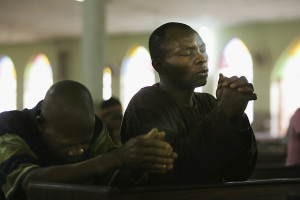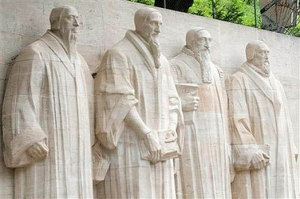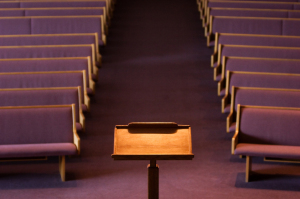USCIRF urges State Dept. to name India on top religious freedom violators list
Bipartisan commission releases 2020 annual report highlighting global persecution
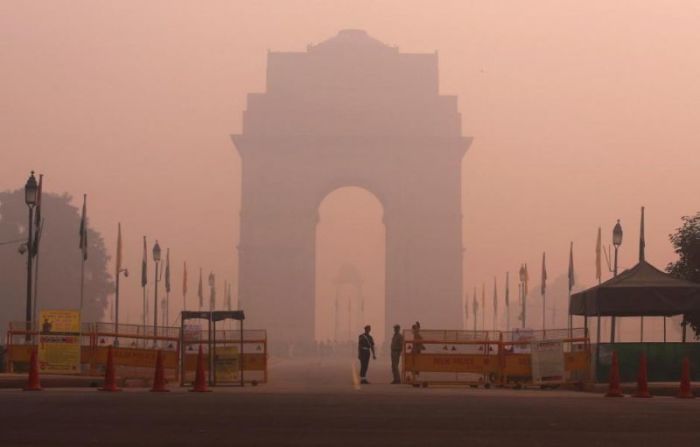
The U.S. Commission on International Religious Freedom has, for the first time since 2004, recommended that the State Department add India to its list of countries that engage in or tolerate egregious violations of religious freedom.
USCIRF, a bipartisan panel of religious freedom activists and scholars tasked with advising the White House, State Department and Congress on religious freedom matters, released its 2020 annual report Tuesday morning.
"While we do see some positive developments in some countries, we noted a noticeable deterioration of religious freedom in others," USCIRF Vice-Chair Nadine Maenza said on a press call on Tuesday.
The report is shorter than it has been in years past to be more accessible to policymakers and it emphasizes key findings that justify the commission’s reasoning for recommending that 14 countries be designated as “countries of particular concern.”
The CPC designation is the State Department’s highest designation when it comes to the issue of religious freedom, which carries with it the potential for crippling sanctions and other negative consequences for violating countries.
Currently, the State Department has designated nine countries as CPCs: Burma, China, Eritrea, Iran, North Korea, Pakistan, Saudi Arabia, Tajikistan and Turkmenistan.
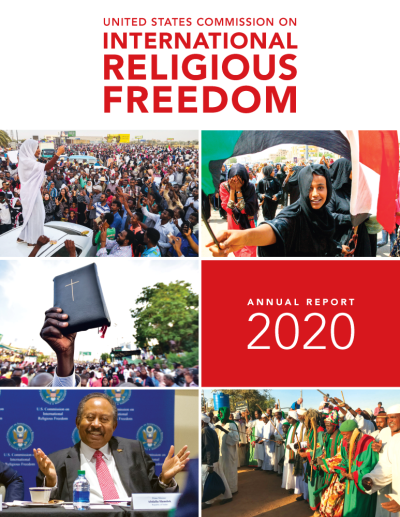
In its report, USCIRF called for the redesignation of those nine countries and again urged that Vietnam, Russia, Syria and Nigeria also be designated as CPCs. This year, India was newly added to USCIRF’s list for CPC designation.
“India took a sharp downward turn in 2019,” the report reads.
India had, since 2009, been labeled by USCIRF as a “Tier 2” country of concern, a designation category that the commission eliminated in 2020.
"Perhaps the steepest and most alarming deterioration of religious freedom conditions [in 2019] was in India, the largest democracy in the world," Maenza told reporters.
USCIRF Chair Tony Perkins said "the majority of the commissioners believe [India] is trending in a very negative direction."
According to the report, violence against Christians in India increased in 2019 and there were at least 328 reported incidents of Christian persecution in 2019. The commission said attacks “frequently targeted prayer services and led to the widespread shuttering or destruction of churches.”
Last year, the Christian group ADF India reported that there were at least 1,000 incidents of Christian persecution in India between 2014 and 2015. Thus far in 2020, the United Christian Forum in India reports that there were 56 threats against Christians and 78 incidents of violence between January and March of 2020 including mob attacks on religious leaders, Christians and churches.
“In 2018, the Supreme Court urged the central and state governments to combat lynchings with stricter laws. When, by July 2019, the central government and 10 states had failed to take appropriate action, the Supreme Court again directed them to do so,” the USCIRF report noted.
“Rather than comply, Home Minister Shah called existing laws sufficient and denied lynchings had increased, while the Home Ministry instructed the National Crime Records Bureau to omit lynchings from the 2019 crime data report.”
The recommendation comes as some religious advocates have been concerned with the lack of vocal opposition in Washington to escalating religious freedom abuses being committed by radical Hindu extremists emboldened by the Bharatiya Janata Party-led government.
India ranks as the 10th-worst country in the world for Christian persecution, according to Open Doors USA.
USCIRF also stressed that the Indian national government has “used its strengthened parliamentary majority to institute national-level policies violating religious freedom across India, especially for Muslims.”
USCIRF held a hearing in March to address concerns regarding recently enacted Citizenship (Amendment) Act, which was meant to provide protection for non-Muslim religious minorities, and how it could result in thousands of Muslim citizens being rendered stateless.
“The CAA’s passage in December sparked nationwide protests that police and government-aligned groups met with violence,” the USCIRF report reads.
“[I]n Uttar Pradesh, the BJP chief minister Yogi Adityanath pledged ‘revenge’ against anti-CAA protestors and stated they should be fed ‘bullets not biryani.’ In December, close to 25 people died in attacks against protestors and universities in UP alone. According to reports, police action specifically targeted Muslims.”
According to the report, over 1 million Muslim residents were excluded from the National Register of Citizens in India’s Assam state.
According to Perkins, the intentions of the national leaders is to bring the National Register of Citizens to the entire country. He said that if the National Register of Citizens is extrapolated out to other states, it will make it difficult for Muslims to prove their citizenship and there could potentially be 100 million people, mostly Muslims, left stateless because of their religion.
USCIRF voiced concerns with how national and state governments have allowed “nationwide campaigns of harassment and violence against religious minorities to continue with impunity.”
As cows are seen as sacred animals by Hindus, cow vigilantes have targeted people accused of slaughtering cows or consuming beef.
“Police often arrest those attacked for cow slaughter or conversion activities rather than the perpetrators,” the report reads.
In addition to the CPC designation, USCIRF calls on the U.S. to “impose targeted sanctions” on Indian government agencies and officials responsible for violations of religious freedom by freezing their assets and barring them entry into the U.S.
The USCIRF report also calls on the State Department to place 15 countries on its less-severe “Special Watch List” for governments that engage in or tolerate severe violations of religious freedom.
The State Department already lists seven countries on the SWL. Those include Comoros, Russia, Uzbekistan, Sudan (previously listed as a CPC), Nigeria, Cuba and Nicaragua.
USCIRF calls on the agency to also designate Afghanistan, Algeria, Azerbaijan, Bahrain, Central African Republic, Egypt, Indonesia, Iraq, Kazakhstan, Malaysia and Turkey as SWLs.
The USCIRF report also highlights global abuses and trends that took place in 2019 and in early 2020.
For the first time in history, USCIRF is not recommending Sudan be designated as a “CPC” as the African country’s transitional government has instituted “historic reforms,” such as the repeal of a strict public order law that restricted the rights of women. Sudan’s new transitional constitution has eliminated reference to Islam as the primary source of law and includes a provision protecting freedom of belief and worship.
But as much work remains to be done in Sudan to guarantee freedom of belief for all, the USCIRF report affirms the State Department’s SWL designation.
For the first time since 2005, USCIRF is not recommending that Uzbekistan be designated as a “CPC” since the government has made progress in addressing longstanding religious freedom concerns. According to USCIRF, Uzbekistan has banned authorities from raiding religious communities for “unregistered activity” or possession of religious literature.
Although things are improving in Sudan and Uzbekistan, the situation still remains dire for many of the countries highlighted in the report.
In Russia, at least 313 Jehovah’s Witnesses were charged, put on trial or convicted for involvement in the religious group by the end of 2019. USCIRF notes that there were at least 489 raids conducted against the homes of Jehovah’s Witnesses in Russia.
Last year also saw an increase in political activism among people wanting reforms in the East African country of Eritrea. However, the government “responded harshly” to both registered religious groups and unrecognized organizations.
According to USCIRF, religious actors in Eritrea were accused of “political interference” just for defending their beliefs or speaking out for human rights.
“Christians were arbitrarily arrested and detained, including in waves of arrests in May of more than 171 adults and children gathering for worship around Asmara,” the report stresses. “In August, another 80 were reportedly arrested for practicing their faith.”
In Tajikistan, government officials burned over 5,000 Baptist calendars after they were seized at Dushanbe International Airport and deemed to be “propaganda of an alien religion.”
USCIRF’s report also touched briefly on the Trump administration’s refugee policies as the president set a refugee resettlement cap of 18,000 refugees for the fiscal year 2020. The figure is the lowest annual cap set since the establishment of the U.S. refugee resettlement program.
And it calls for the U.S. to “return the annual ceiling for the United States Refugee Admissions Program to the previously typical 95,000” refugees per fiscal year.
However, USCIRF praised the Trump administration for designating $25 million for restoring and rebuilding religious sites and houses of worship across the world, a key recommendation in USCIRF's 2019 report.
USCIRF also praised the administration for appointing an adviser on international religious freedom to the National Security Council, the fulfillment of another USCIRF recommendation.
Follow Samuel Smith on Twitter: @IamSamSmith
or Facebook: SamuelSmithCP
















